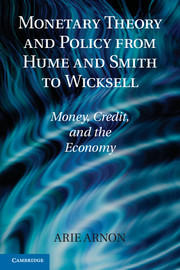Book contents
- Frontmatter
- Dedication
- Contents
- List of Illustrations
- List of Tables
- Preface
- Introduction
- Part one Analytical and Historical Foundations
- Part two Debating Monetary Theory under Inconvertibility
- 5 New Reality
- 6 The Early Round of the Bullion Debate 1800–1802
- 7 Thornton on Inconvertibility and Central Banking
- 8 Ricardo versus Bosanquet
- 9 “Credit Theories of Money” in Exchange and Intermediation
- Part three Debating
- Part four The Road to Defensive Central Banking
- Part five A New Beginning
- Bibliography
- Author Index
- Subject Index
7 - Thornton on Inconvertibility and Central Banking
Ahead of His Time1
Published online by Cambridge University Press: 05 July 2014
- Frontmatter
- Dedication
- Contents
- List of Illustrations
- List of Tables
- Preface
- Introduction
- Part one Analytical and Historical Foundations
- Part two Debating Monetary Theory under Inconvertibility
- 5 New Reality
- 6 The Early Round of the Bullion Debate 1800–1802
- 7 Thornton on Inconvertibility and Central Banking
- 8 Ricardo versus Bosanquet
- 9 “Credit Theories of Money” in Exchange and Intermediation
- Part three Debating
- Part four The Road to Defensive Central Banking
- Part five A New Beginning
- Bibliography
- Author Index
- Subject Index
Summary
Introduction
Henry Thornton (1760–1815) was born in London to an Evangelical family and became one of the leaders of what has been known as the “Clapham Sect,” probably named after his house in Clapham, which was the group’s headquarters. One of the group’s better-known leaders was his close friend and second cousin, William Wilberforce, remembered mainly for his work in the antislavery abolitionist movement, for promoting literacy in Britain, and for his missionary activities throughout the Empire. The family was engaged in trade with Russia, but Thornton left the family business against his father’s advice and made a successful living as a banker in London. His deep religious belief guided him in life; he contributed six-sevenths of his income to charity before his marriage in 1796, and one-quarter after. Thornton was a Member of Parliament from 1782 until his death in 1815. He wrote many works on religious matters and one seminal treatise on money and banking, An Enquiry into the Nature and Effects of the Paper Credit of Great Britain (1802) (Paper Credit) that we will discuss in this chapter.
As we argued in the previous chapter, Jacob Viner (1937), Frank Fetter (1965), Denis O’Brien (2004), and Friedrich von Hayek (1929a/1991), among others, present Walter Boyd, Peter King, Francis Horner, and Henry Thornton as the main Bullionist contributors to the Bullion debate. This latter group of writers is often referred to by scholars as the “moderate Bullionists,” as opposed to the “extreme Bullionists” such as John Wheatley (1803) and David Ricardo. In the earlier secondary literature, one can find a different categorization. Jacob Hollander (1911) associates Thornton with the anti-Bullionists. However, he does not think highly of him as do later scholars, and in fact argues that Thornton’s stance on inconvertibility is untenable.
- Type
- Chapter
- Information
- Monetary Theory and Policy from Hume and Smith to WicksellMoney, Credit, and the Economy, pp. 96 - 125Publisher: Cambridge University PressPrint publication year: 2010



